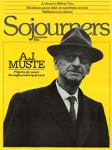Time will devour us. The greatest will dim and vanish as those who remembered them are themselves forgotten. But while we have the memory of the truly great still with us, the greater problem is not that we shall forget them, but that we shall tame them, smooth their rough edges, and make them round and comfortable in our heads. In Terre Haute, Indiana, they now have an annual "Debs Day Dinner," honoring unionist Eugene Debs, at which every crooked capitalist politician and corrupt labor leader in Indiana feels obliged to show up (along, I am sure, with many decent and worthy figures).
Saints and radicals frighten us. We hear them only when they are safely dead; we make holidays for people we jailed when we had them in our midst, as with Martin Luther King Jr. For no one is this truer than A.J. Muste, born in Holland, who grew up an American radical. He was not widely known even at his death, and yet his death occasioned telegrams of regret and sympathy from Ho Chi Minh and Robert Kennedy. His public memorial service was attended not only by leaders of the Fellowship of Reconciliation, War Resisters League, and Communist and Socialist Workers Party, but by Herman Kahn, a nuclear apologist.
One might have thought that anyone who wandered so freely over the political map would have lost credibility rather than gained it. Yet at the end of his life he probably had a greater influence on events than at any other time.
Let me begin there, at the end. In the early 1960s, various efforts had been made to form a coalition against the Vietnam War, but each effort was in some way exclusive of other groups. When the great and complex coalitions were finally built, it was around the figure of Muste, because in him all sides found a man they could trust. Catholics, Communists, Quakers, Trotskyites, Socialists, pacifists—all accepted Muste as the leader of the coalitions, and to this cause he gave the final years of his life. He died only weeks after his return from a trip to Hanoi.
This sense of trust came from a realization that when A.J. changed his positions, it was never because the old position had become unpopular, but because he was drawn to new positions and new experiments. To the degree I am able, I understand and accept Muste's general political analysis, part of which was to continually shift and change positions as the situation changed. Certainly there were a number of occasions when I disagreed with Muste and, looking back, I still think I was right.
What made Muste special was his ability to accept disagreement without feeling betrayed or threatened. He was a man who realized more deeply each day of his life that the age of violence had to end; that if we sought to establish the kingdom of God, we needed to behave in the here and now as if we were citizens of that society still to be created.
Yet Muste was never simply a "moral man." He shared with Gandhi the knowledge that morality or religion without politics was impossible. He worked with how to drive the moral principle into the hard, unyielding ground of our society, our "political world." This was his quest, never finished, rarely done too well. But few try it at all.
If I had to choose one thing for which to remember A.J. Muste, one quality I hope to emulate, it would be this: in the years I knew him (I was 24 and he was 68 when I began working with him), never once did he rebut me or any younger person with a reference to "when you've been around as long as I have," or "when I was younger I used to think the same thing." He took each person on an equal basis, and in treating us with respect, gained a respect that he never lost.
David McReynolds was national staffperson of the War Resisters League in New York City and chairperson of the A.J. Muste Memorial Institute when this article appeared.

Got something to say about what you're reading? We value your feedback!
